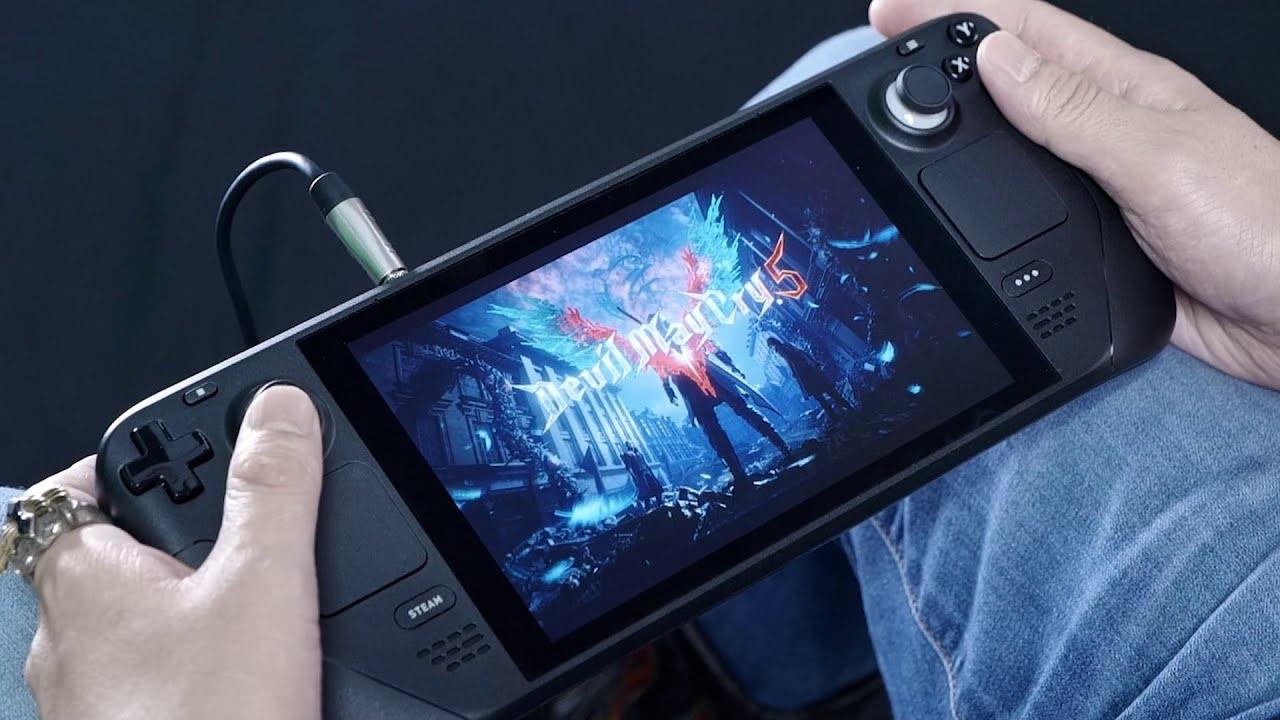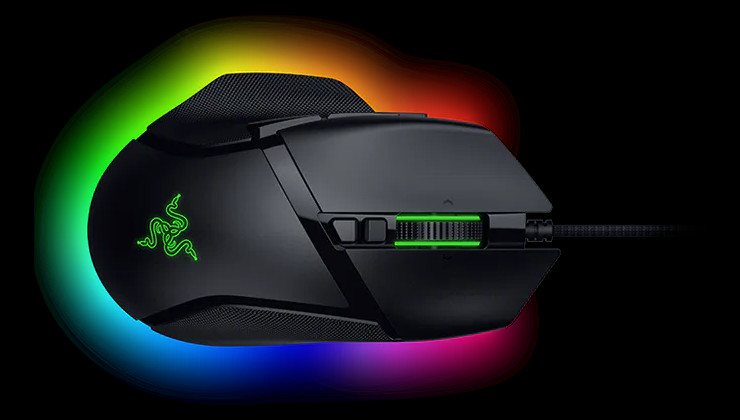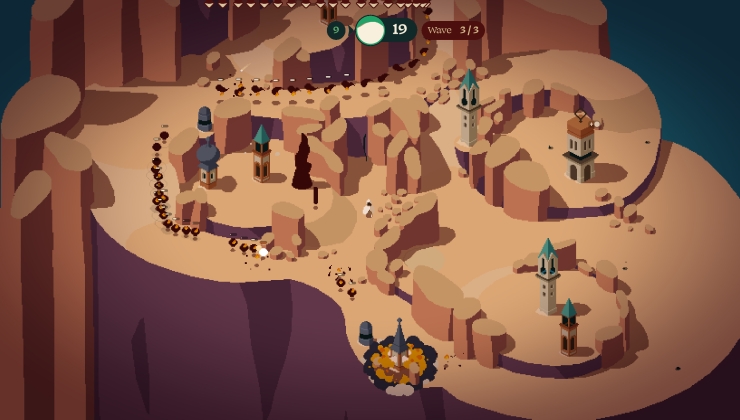As more developers get their hands on a Steam Deck devkit, we're seeing plenty more show their games and now Capcom has taken a turn with Devil May Cry 5.
Unlike a lot of what we've seen previously via small clips or plain pictures on Twitter, Capcom went a tiny step further by making a video on their official Capcom USA YouTube Channel - that's quite a bit of extra advertisement power there for the Steam Deck.

Direct Link
The video description notes the gameplay is being presented by the Lead Game Designer.
That looks like it runs very nicely too, very smooth action. Not totally unexpected though, since Devil May Cry 5 has worked well with Steam Play Proton for quite a while now. Since the Steam Deck resolution is only 1280 x 800px, most games should hopefully scale down quite well for it.
In case you missed it: Proton 6.3-8 was recently released. With more games working, DLSS for DirectX 11 and 12, CEG DRM support and more.
In theory, anyhow. In practice they might try, but they're too cheap to back their play hard enough to win.
But yeah, they could still imagine doing it and treat people as competitors even though in the real world they will never seriously compete with them . . .
i think their main issue is geting stake holders onboard.
i mean, they may want to continue trying something, but the stake holders who truly own the money pull the plug to early without thinking about long term consequences and they are forced to axe their projects.
stadia was not just an way for then to enter the gaming market, but to make chromeOS relevant in the operating system market too, who would purchase an expensive gaming rig running windows, when they could just pick the cheapest chromeOS run stadia on it and do the same thing?
if microsoft decided that for any reason xcloud would not support chromeOS, or if amazon or other player did that, chromeOS gamers would be screwed, google wanted to secure both sides but their stake holders didnt wanted to lose money for years until google figure out how to turn stadia into a profitable business.
it helps nothing that any prediction that google made about the initial reception of stadia was... wrong, and they failed to deliver many features for so much time that people dont know they exist even now that they are avaliable.
now, they show one prediction for stake holders and the reality is nothing like it, then they try to predict again after making some moves to increase it popularity and fail to predict again and again the result, who gonna trust then?
on the other hand, if they sucessfully raise stadia marketshare when their founders are the only ones left believing in it... they take all the profit...
i'm not saying that they are hidding an trump card to use like this, its just that... if they did one move right, the fate of the platform may quickly change from "no one want to fund it" to "everyone want"
now... can they change the perception that gamers have about stadia? i dont think so, i was willing to belive and wanted to see it happens (not because i like cloud or stadia but because i was desperate to see linux grow or at least became more viable for gaming) but now i dont believe they can change it anymore (anything they do may be too litle too later and it dont seems they are trying) nor i do care anymore.
The fork done by the FreeBSD team (libressl) was done because the FreeBSD devs wanted more control over such a central piece of software that had gotten stale. Due note that the funding that happened due to this went to OpenSSL and not to LibreSSL and while LibreSSL was the better library for a short while, the OpenSSL project got rejuvenated in the process and LibreSSL is now basically only used by FreeBSD and the distros and projects that went with LibreSSL are close to all back to using OpenSSL again.
It was actually done by OpenBSD folks, though porting it to FreeBSD might have been faster than to Linux. After all FreeBSD and OpenBSD share same 386BSD ancestry. Linux is it's own thing and thus is not by default compatible with things developed on other operating systems. Same thing applies on other direction too.
LibreSSL threw away lot of legacy things in order to improve security. So the goal wasn't just add features on top of OpenSSL. Which might explain why supporting LibreSSL hasn't been always that easy. Which might explain why supporting LibreSSL as OpenSSL replacement might have not been worthwhile once OpenSSL started to be good enough again.
Not that forking hasn't stopped to LibreSSL. Both Tink(Google) and S2N(Amazon) seem to roughly follow same ideals. I noticed that both share same license with OpenSSL, Apache 2.0. So they are able to share code if necessary. LibreSSL seems to be stuck with the older OpenSSL license.
Except you can't run Stadia or Stadia games locally, on any hardware. The hardware platform is not relevant, in this particular case. Sorry if it wasn't clear enough.no you are not clear at all.
you tried to justify that android didnt helped the linux desktop because android is (mostly) arm devices...
but then you quoted stadia as if it was in the same category as android, and its not...
No. Don't try speaking on my behalf, you are totally wrong... Please read again my sentence in my first post. That's not how it's constructed. There is absolutely no mention of ARM in the whole Stadia sentence. You made a shortcut or misunderstood. Sorry.
Edit: The same category you are referring to is not "ARM"... It's "no interrelation with the desktop". That was my intent from the start.
Last edited by Mohandevir on 28 Nov 2021 at 4:15 pm UTC
The fork done by the FreeBSD team (libressl) was done because the FreeBSD devs wanted more control over such a central piece of software that had gotten stale. Due note that the funding that happened due to this went to OpenSSL and not to LibreSSL and while LibreSSL was the better library for a short while, the OpenSSL project got rejuvenated in the process and LibreSSL is now basically only used by FreeBSD and the distros and projects that went with LibreSSL are close to all back to using OpenSSL again.
It was actually done by OpenBSD folks, though porting it to FreeBSD might have been faster than to Linux. After all FreeBSD and OpenBSD share same 386BSD ancestry. Linux is it's own thing and thus is not by default compatible with things developed on other operating systems. Same thing applies on other direction too.
LibreSSL threw away lot of legacy things in order to improve security. So the goal wasn't just add features on top of OpenSSL. Which might explain why supporting LibreSSL hasn't been always that easy. Which might explain why supporting LibreSSL as OpenSSL replacement might have not been worthwhile once OpenSSL started to be good enough again.
Not that forking hasn't stopped to LibreSSL. Both Tink(Google) and S2N(Amazon) seem to roughly follow same ideals. I noticed that both share same license with OpenSSL, Apache 2.0. So they are able to share code if necessary. LibreSSL seems to be stuck with the older OpenSSL license.
Yeah sorry about that, my memory somehow confused OpenBSD with FreeBSD there. Yes they threw away a lot of legacy stuff to make the code easier to work with, uncertain if any of the stuff they threw out improved security in any way but of course a more easy code base to work with can lead to improved security.
The huge stupid thing that they did though is that they froze the API to that of OpenSSL v1.0.1g but set the OPENSSL_VERSION_NUMBER define to v2.0.0 and that both broke a lot of software and people had to do some really cludgy workarounds like
# if (defined LIBRESSL_VERSION_NUMBER && OPENSSL_VERSION_NUMBER == 0x20000000L)
# undef OPENSSL_VERSION_NUMBER
# define OPENSSL_VERSION_NUMBER 0x1000107fL
# endifAnd then pray and hope that LibreSSL didn't change API ever. So I'm for one glad that the days of LibreSSL is mostly over due to the maintenance headache it caused.
Except you can't run Stadia or Stadia games locally, on any hardware. The hardware platform is not relevant, in this particular case. Sorry if it wasn't clear enough.no you are not clear at all.
you tried to justify that android didnt helped the linux desktop because android is (mostly) arm devices...
but then you quoted stadia as if it was in the same category as android, and its not...
No. Don't try speaking on my behalf, you are totally wrong... Please read again my sentence in my first post. That's not how it's constructed. There is absolutely no mention of ARM in the whole Stadia sentence. You made a shortcut or misunderstood. Sorry.
Edit: The same category you are referring to is not "ARM"... It's "no interrelation with the desktop". That was my intent from the start.
Well you did write "You are comparing ARM hardware with x86... There is absolutely no hardware interrelations between them. Same for Stadia, there are no interrelations with the desktop", it's quite easy to be confused with the "Same for Stadia" that just followed the whole ARM vs x86.
Not really sure what ARM vs x86 have to do with the issue either since all Android apps are written in Java/Dalvik and not ARM anyway.
Except you can't run Stadia or Stadia games locally, on any hardware. The hardware platform is not relevant, in this particular case. Sorry if it wasn't clear enough.no you are not clear at all.
you tried to justify that android didnt helped the linux desktop because android is (mostly) arm devices...
but then you quoted stadia as if it was in the same category as android, and its not...
No. Don't try speaking on my behalf, you are totally wrong... Please read again my sentence in my first post. That's not how it's constructed. There is absolutely no mention of ARM in the whole Stadia sentence. You made a shortcut or misunderstood. Sorry.
Edit: The same category you are referring to is not "ARM"... It's "no interrelation with the desktop". That was my intent from the start.
Well you did write "You are comparing ARM hardware with x86... There is absolutely no hardware interrelations between them. Same for Stadia, there are no interrelations with the desktop", it's quite easy to be confused with the "Same for Stadia" that just followed the whole ARM vs x86.
Not really sure what ARM vs x86 have to do with the issue either since all Android apps are written in Java/Dalvik and not ARM anyway.
If Android influenced something, it's the adoption of Chromebooks. Is it possible to easily run Android apps on other Linux distributions, as in "for new Linux users"? Don't think so... Please, correct me if I'm wrong.
But I must admit that I could have changed paragraph, before talking about Stadia to mark the change of subject. Still the ";" marks the explanation to why there is no hardware interrelations.
Pretty semantic, that discussion.
But saying that I'm dishonnest is pretty far fetched.
Last edited by Mohandevir on 28 Nov 2021 at 5:14 pm UTC
No. Don't try speaking on my behalf, you are totally wrong... Please read again my sentence in my first post. .
sorry i think i mixed your comment with some one else then, so many comments that i got confused... maybe....
Not really sure what ARM vs x86 have to do with the issue either since all Android apps are written in Java/Dalvik and not ARM anyway.
Imo, this is too technical for newcomers. What they want to know it's if it's going to run on their computer, plug & play style. Not what tech it uses. If the answer is yes, there is an hardware interrelation. If not, the chain is broken and they will stick to Windows. As simple as that.
Sure thing, if the Steam Deck is successfull and it doesn't translate into Linux desktop gain, nothing will. It's going to be a good indication, imo, that aside from tech savy users, Linux is best suited for dedicated hardware with single use mindset.
Last edited by Mohandevir on 28 Nov 2021 at 6:51 pm UTC
One computer for work, supplied by the company that hired them and a personnal gaming rig that is used only for that: gaming. Everything else is done on smartphones nowadays... My daughter has a Win10 laptop and it's barely used anymore. Little gaming, here and there and all else, from video editing to photos/photo editing is done on cell phone too... Similar for my son, except he's more of a gamer. Are we weird phenomenons?
I hear the eternal "photoshop gig" to explain why Linux is not catching up on the desktop, but is it still that much true? I have the feeling that we are in an era where the versatility of desktops is mainly exploited at work... Am I wrong to think so?
Last edited by Mohandevir on 28 Nov 2021 at 7:59 pm UTC
But what I would like to know is how many people, in Steam user pool, is like me:I know plenty of people like you so I doubt you're weird, but I'm pretty much the opposite. I've also got a computer at work (a proper desktop, not a laptop; I like leaving my "tools" at the office) and another at home for gaming and other entertainment. And then there's my wife's graphics workstation, which I borrow when I need to edit photos or something, but that's not very often. All of these systems run Linux obviously. ;)
One computer for work, supplied by the company that hired them and a personnal gaming rig that is used only for that: gaming. Everything else is done on smartphones nowadays... My daughter has a Win10 laptop and it's barely used anymore. Little gaming, here and there and all else, from video editing to photos/photo editing is done on cell phone too... Similar for my son, except he's more of a gamer. Are we weird phenomenons?
But my phone I only use when I absolutely need to. It simply feels silly to try to do anything productive on a tiny touch screen when I've got more powerful hardware with better input methods and larger screens at hand. A smartphone has its advantages, mainly to do with it being small and easy to carry around with you, but it's never my first choice for getting something done or entertaining myself.
But what I would like to know is how many people, in Steam user pool, are like me:
One computer for work, supplied by the company that hired them and a personnal gaming rig that is used only for that: gaming. Everything else is done on smartphones nowadays... My daughter has a Win10 laptop and it's barely used anymore. Little gaming, here and there and all else, from video editing to photos/photo editing is done on cell phone too... Similar for my son, except he's more of a gamer. Are we weird phenomenons?
I hear the eternal "photoshop gig" to explain why Linux is not catching up on the desktop, but is it still that much true? I have the feeling that we are in an era where the versatility of desktops is mainly exploited at work... Am I wrong to think so?
Ah yes, every single Windows user out there seems to be working in advanced design and imaging considering how often Photoshop is brought up as as stop gap :). Meanwhile not a single person at my office have ever opened any image application ever...
I think that you probably represent how most people use machines today, young people tend to use their phones the way we older people use laptops basically. Myself I cannot stand to use a phone for most things and use a computer for everything but I know that I'm the exception.
Not really sure what ARM vs x86 have to do with the issue either since all Android apps are written in Java/Dalvik and not ARM anyway.
Imo, this is too technical for newcomers. What they want to know it's if it's going to run on their computer, plug & play style. Not what tech it uses. If the answer is yes, there is an hardware interrelation. If not, the chain is broken and they will stick to Windows. As simple as that.
Sure thing, if the Steam Deck is successfull and it doesn't translate into Linux desktop gain, nothing will. It's going to be a good indication, imo, that aside from tech savy users, Linux is best suited for dedicated hardware with single use mindset.
Well I'm not sure that the Deck will drive Linux adoption, it will help us Linux gamers for sure since there will be a lot of publishers wanting to be part of the launch event making sure that their games work in Proton or natively, something that in some way of course could drive adoption but I don't see a launch of a new console as something that will make a big dent in the Linux desktop adoption.
Linux desktop adoption is simply a long long process, if lucky we will some day reach macOS numbers but we will never reach Microsoft levels. That war was lost before Linux even existed when MS made sure with their shady business tactics that they got a large enough monopoly that PC equals Windows in everybody's mind.
Which is why I hate when people like LTT make claims like "if GitHub is only for developers then that means that Linux is only for developers" when the whole frakking reason we don't have hardware support for his GoXLR in Linux is due to the shady practises of Microsoft. Its a hill that we have to climb up, but the thing is that the hill is artificially created and keep on getting steeper and steeper as we climb it.
At this point I am not even fussed about how many native ports we're getting. I don't care, as long as the games I want to play on Linux do run on Linux. And with exactly one notable exception, they do. Even if our market share never grows beyond 2%, we've already won. MS no longer has a stranglehold on gaming, because we're no longer forced to rely on devs to take pity on us and actually release a port of their games. We can run most of them without even asking them. And THAT's what Deck gave us.
Obviously it's only applicable for those that use their PCs exclusively for gaming and are interrested in the Steam Deck.
By the way, I dislike doing anything on my cell phone too, but sometimes, it's at arms reach and easier to pick up, just like the Steam Deck will probably be (only the arms reach and easier to pick up parts, I mean).
Last edited by Mohandevir on 28 Nov 2021 at 9:18 pm UTC
Which is why I hate when people like LTT make claims like "if GitHub is only for developers then that means that Linux is only for developers" when the whole frakking reason we don't have hardware support for his GoXLR in Linux is due to the shady practises of Microsoft. Its a hill that we have to climb up, but the thing is that the hill is artificially created and keep on getting steeper and steeper as we climb it.
To add insult into injury, Github is owned by Microsoft. Github sure does have some usability problems, it doesn't matter if you're developer or not. Linus is just taking the mentality that he doesn't want to be developer bit too seriously.
Github just happens to be the place where the projects start. Some projects don't even bother with packaging and let distributions handle that.
I guess the difference is that with Windows, projects that don't have any kind of infrastructure yet, get way less attention. It used to be bit complicated to set up free development environment for Windows. With Linux all you need sometimes is just GCC and text editor, possibly Make on top of that.
As for GoXLR, somebody with Windows can be valuable. I think one of the first things to do with when creating new USB driver is to snoop the traffic between the Windows and the device. I have no idea how easy it is to just record the traffic and replay it on Linux without creating a driver first.
Optimally there would be official driver, but I would assume getting it accepted into kernel might take few rounds of reviews as it might take a while get used to the conventions.
Which is why I hate when people like LTT make claims like "if GitHub is only for developers then that means that Linux is only for developers" when the whole frakking reason we don't have hardware support for his GoXLR in Linux is due to the shady practises of Microsoft. Its a hill that we have to climb up, but the thing is that the hill is artificially created and keep on getting steeper and steeper as we climb it.
To add insult into injury, Github is owned by Microsoft. Github sure does have some usability problems, it doesn't matter if you're developer or not. Linus is just taking the mentality that he doesn't want to be developer bit too seriously.
Github just happens to be the place where the projects start. Some projects don't even bother with packaging and let distributions handle that.
I guess the difference is that with Windows, projects that don't have any kind of infrastructure yet, get way less attention. It used to be bit complicated to set up free development environment for Windows. With Linux all you need sometimes is just GCC and text editor, possibly Make on top of that.
As for GoXLR, somebody with Windows can be valuable. I think one of the first things to do with when creating new USB driver is to snoop the traffic between the Windows and the device. I have no idea how easy it is to just record the traffic and replay it on Linux without creating a driver first.
Optimally there would be official driver, but I would assume getting it accepted into kernel might take few rounds of reviews as it might take a while get used to the conventions.
Capturing the USB traffic is easy enough without a driver but you must also correctly interpret it and there is nothing that prevents a vendor from communicating with a device over an encrypted channel (not that I think that GoXLR does but it's a possibility). And for GoXLR in particular they handle everything in the application, the device doesn't even have memory to store the configuration between resets so you have to also rewrite their entire application. The exe alone is 16MB and then there is a 4MB driver as well (just tested it in a W10 instance in Virtual Box).
Linux desktop adoption is simply a long long process, if lucky we will some day reach macOS numbers but we will never reach Microsoft levels. That war was lost before Linux even existed when MS made sure with their shady business tactics that they got a large enough monopoly that PC equals Windows in everybody's mind.You'd think that. But in some ways Microsoft has been too successful. When my wife got a Chromebook, and I was helping her figure out how to use it, it became apparent that she did not in fact really know what Windows was. She also didn't understand the distinction between a web browser and an operating system, or indeed between software and the OS in general. So the idea that the difference between her new dinky cheap laptop and her computer at work had a lot to do with the difference between a thing called Windows and a thing called ChromeOS, just didn't immediately have a meaning to her at all.
There are a lot of people out there like my wife. If some big computer manufacturer starts selling their computers with Linux on, an awful lot of people won't really get that there's a difference.
But my phone I only use when I absolutely need to. It simply feels silly to try to do anything productive on a tiny touch screen when I've got more powerful hardware with better input methods and larger screens at hand. A smartphone has its advantages, mainly to do with it being small and easy to carry around with you, but it's never my first choice for getting something done or entertaining myself.I don't actually own a cell phone.
But if I had one, my main stumbling block when it comes to using it for computer stuff would be, real keyboard. My main thing is word processing, walls of text on GamingOnLinux
(Maybe you wouldn't know the difference if you never learned to touch type, which it amazes me never became standard school curriculum. It just takes a term and you're set for life--I got a C-, but the skill was acquired, might have been the most useful thing I learned in high school)
Last edited by Purple Library Guy on 28 Nov 2021 at 11:03 pm UTC
Linux desktop adoption is simply a long long process, if lucky we will some day reach macOS numbers but we will never reach Microsoft levels. That war was lost before Linux even existed when MS made sure with their shady business tactics that they got a large enough monopoly that PC equals Windows in everybody's mind.You'd think that. But in some ways Microsoft has been too successful. When my wife got a Chromebook, and I was helping her figure out how to use it, it became apparent that she did not in fact really know what Windows was. She also didn't understand the distinction between a web browser and an operating system, or indeed between software and the OS in general. So the idea that the difference between her new dinky cheap laptop and her computer at work had a lot to do with the difference between a thing called Windows and a thing called ChromeOS, just didn't immediately have a meaning to her at all.
There are a lot of people out there like my wife. If some big computer manufacturer starts selling their computers with Linux on, an awful lot of people won't really get that there's a difference.
Well here's to hoping. Wish I was a billionaire so that I could invest tons of money into creating the perfect Linux computer that was as slick as a Chromebook and have it been sold in normal stores. We need a new Canonical anno 2004 to pour resources into moving Linux closer to the customers.
Well here's to hoping. Wish I was a billionaire so that I could invest tons of money into creating the perfect Linux computer that was as slick as a Chromebook and have it been sold in normal stores. We need a new Canonical anno 2004 to pour resources into moving Linux closer to the customers.It would need to be someone bigger than Canonical was. They did pour resources into a slick Linux device, worked out software packaging and distribution, took cues from Android about how to avoid the cruft of X11, developed an interface paradigm for convergence with the desktop... and then ran out of money, had to fire a bunch of people, and had to give up. So like Canonical, but with sufficient resources to be able to survive, say, 5 years more burn.









 How to set, change and reset your SteamOS / Steam Deck desktop sudo password
How to set, change and reset your SteamOS / Steam Deck desktop sudo password How to set up Decky Loader on Steam Deck / SteamOS for easy plugins
How to set up Decky Loader on Steam Deck / SteamOS for easy plugins
See more from me